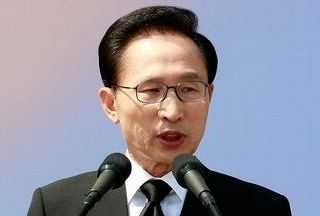South Korea would leave the door open for dialogue with North Korea despite new threats from its neighbour because peace and stability on the Korean Peninsula is the priority, South Korean President Lee Myung Bak said Monday, dpa reported.
Lee said in his New Year's address that he hoped the leadership change in North Korea after the death last month of Kim Jong Il and the ascension of his son Kim Jong Un would mark a turning point in inter-Korean relations.
"If North Korea shows its attitude of sincerity, a new era on the Korean Peninsula can be opened," the president said.
At the same time, however, Lee said South Korea's military would be on guard and would "strongly respond" to provocations from the North.
Lee spoke four days after North Korea declared Kim Jong Un "supreme leader of the party, state and army" at the memorial service for his father.
A day later, the new regime of the communist country declared it would "refuse forever to engage with traitor Lee Myung Bak," whose government North Korean often dubs a "puppet" of the United States.
"As long as the possibility of North Korea's provocation remains, we will maintain a watertight defence posture," Lee said. "If provoked, we will strongly respond."
In its own New Year's message, North Korea said Sunday that its army would "become human rifles and bombs to defend him [Kim Jong Un] unto death."
Lee said Monday that six-nation talks aimed at ending North Korea's nuclear weapons programme could resume only when the North puts a stop to all its nuclear activities.
The talks involving the two Koreas, the United States, China, Japan and Russia have been stalled since late 2008, and North Korea withdrew from them in 2009 shortly before conducting its second nuclear test. It had previously demanded no conditions be imposed for a return to the negotiating table.
Relations between the two Koreas have been poor since conservative Lee took office in 2008. He took a harder line toward the North than his liberal predecessors, insisting, for instance, that Pyongyang show progress in denuclearization if it wanted to continue to receive aid from Seoul.
Tensions reached a high point in 2010 with the sinking of a South Korean warship, which Seoul blamed on Pyongyang and Pyongyang denied, and North Korea's artillery bombardment of a South Korean border island. The two incidents killed 50 South Koreans.
Both nations remain technically at war after an armistice and not a peace treaty ended the 1950-53 Korean War.
Analysts said they worry about new provocations from North Korea as a way for the inexperienced Kim Jong Un, who is believed to be in his late 20s, to consolidate his power.
Pyongyang expressed anger and threatened retribution after his father's death for "hideous crimes" committed by Seoul while the North was mourning.
Pyongyang was angered when Seoul offered sympathy to the North Korean people but not its government and did not send an official mourning delegation.






